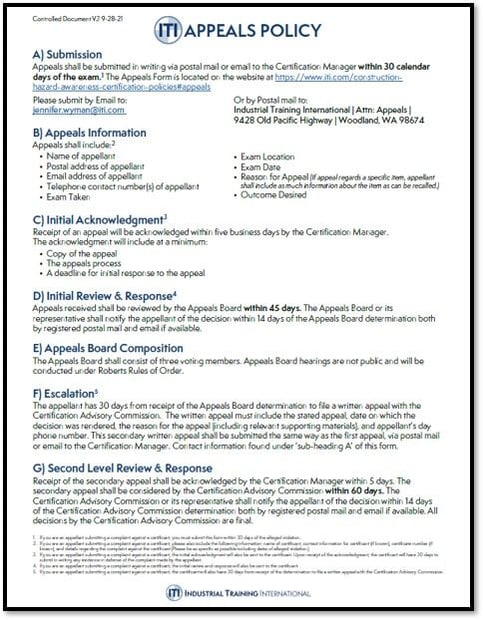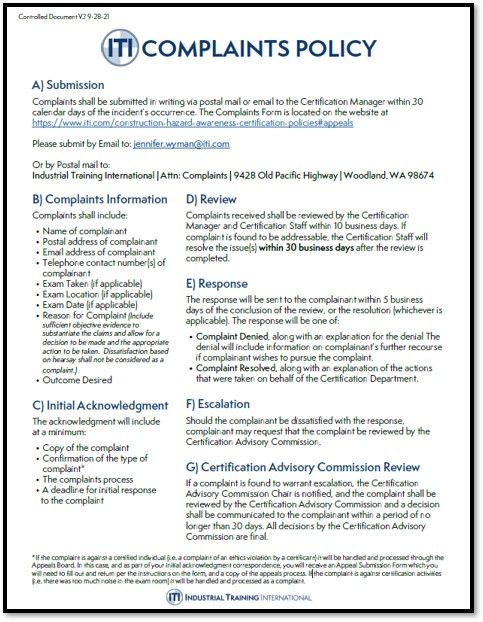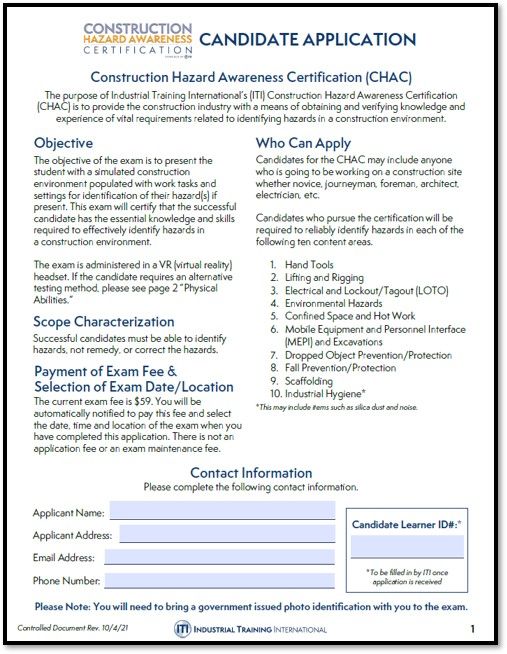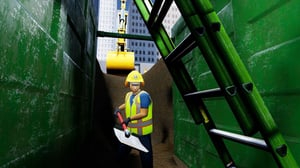
Construction Hazard Identification Certification
Certification application, Public Statement and Policies for attaining the Hazard ID Certification
TABLE OF CONTENTS
Contents
Construction hazards are plentiful, as are the training programs that address them like OSHA-10, online courses, and various internal safety courses. Practical, immersive assessment on how to identify hazards has not been available...until now! Learn about how the application was developed, the contents, and the NSC Hazard Awareness Certification.
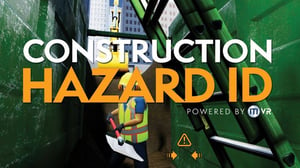
Get Certified
Certification candidates include anyone who is going to be working on or around an active construction site whether novice, journeyman, foreman, architect, electrician, or any other trade and/or role.
There are no prerequisites for the assessment. Training that includes a cross section of topics from OSHA 29 CFR 1926 can be taken by candidates prior to the exam. This training, though not required, is highly recommended.
Steps required to become Hazard Awareness Certified*
1. Complete and submit the certification application.
2. Select an approved test site and schedule your assessment.
3. Arrive at your test site 15 minutes before your scheduled assessment and check-in with the proctor. Bring the following to your assessment:
- Certificate Learner ID# (provided upon completing the application)
- Valid state or federal photo identification (Driver's License, Passport, etc.)
4. Take your assessment!
5. Results will be available via your learner profile (via the ITI Learning Hub) within 48 hours of completing the assessment.
Successful candidates will receive a Hazard Awareness Certification that is valid for five (5) years.
*An all-inclusive certification fee of $59 is required.
Statement to the Public
(Updated August 12, 2021)
Impartiality and Conflict of Interest
An ITI employee will not participate in any activity, either as volunteer or for pay, in which there may be a conflict of interest with activities related to the ITI certification programs. ITI staff will bring potential conflicts of interest to the attention of a supervisor for interpretation and guidance. All certification activities are processed by ITI staff in an objective and impartial manner.
Privacy and Security of Individual Information
ITI shall safeguard the privacy of individuals, where applicable, and shall hold in confidence and in a secure manner the information obtained in the course of certification program activities at all levels of the organization, including the activities of all personnel (paid, subcontracted or volunteer) acting on its behalf. Except as required in the Policies and Procedures Manual, information about a particular individual is considered confidential information and shall not be disclosed to a third party by ITI personnel (paid, volunteer or subcontractor) without prior written consent of the individual. Where the law requires information to be disclosed to a third party, the individual shall be notified beforehand of the information provided.
Purpose
The purpose of the exam is to present the student with a simulated construction environment populated with work tasks and settings for identification of their hazard(s) if present. This exam will certify that the successful candidate has the essential knowledge and skills required to effectively identify hazards in a construction environment.
Scope Characterization
Successful candidates must be able to identify hazards, not remedy, or correct the hazards.
CHA Certification
Candidates for the CHA (Construction Hazard Awareness) certification may include anyone who is going to be working on a construction site whether novice, journeyman, foreman, architect, electrician, etc.
There are no prerequisites for this exam. Training that includes a cross section of topics from OSHA 29 CFR 1926 can be taken by candidates prior to the exam. This training, though not required, is highly recommended.
Candidates who pursue the certification will be required to reliably identify hazards in each of the following ten content areas.
- Hand Tools
- Lifting and Rigging
- Electrical and Lockout/Tagout (LOTO)
- Environmental Hazards
- Confined Space and Hot Work
- Mobile Equipment and Personal Interface (MEPI) and Excavations
- Dropped Object Prevention/Protection
- Fall Prevention/Protection
- Scaffolding
- Industrial Hygiene*
*This may include items such as silica dust and noise.
- Appeals Policy
- Complaints Policy
- View/Download Application

